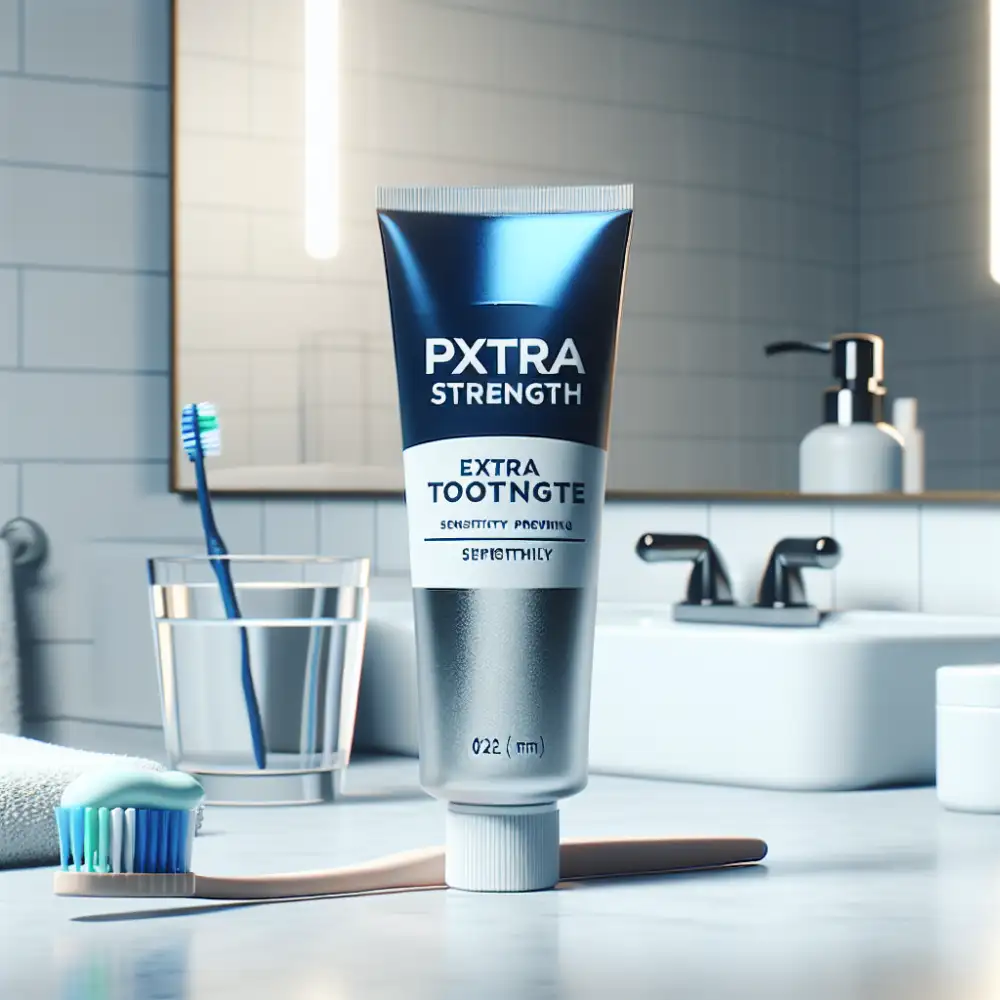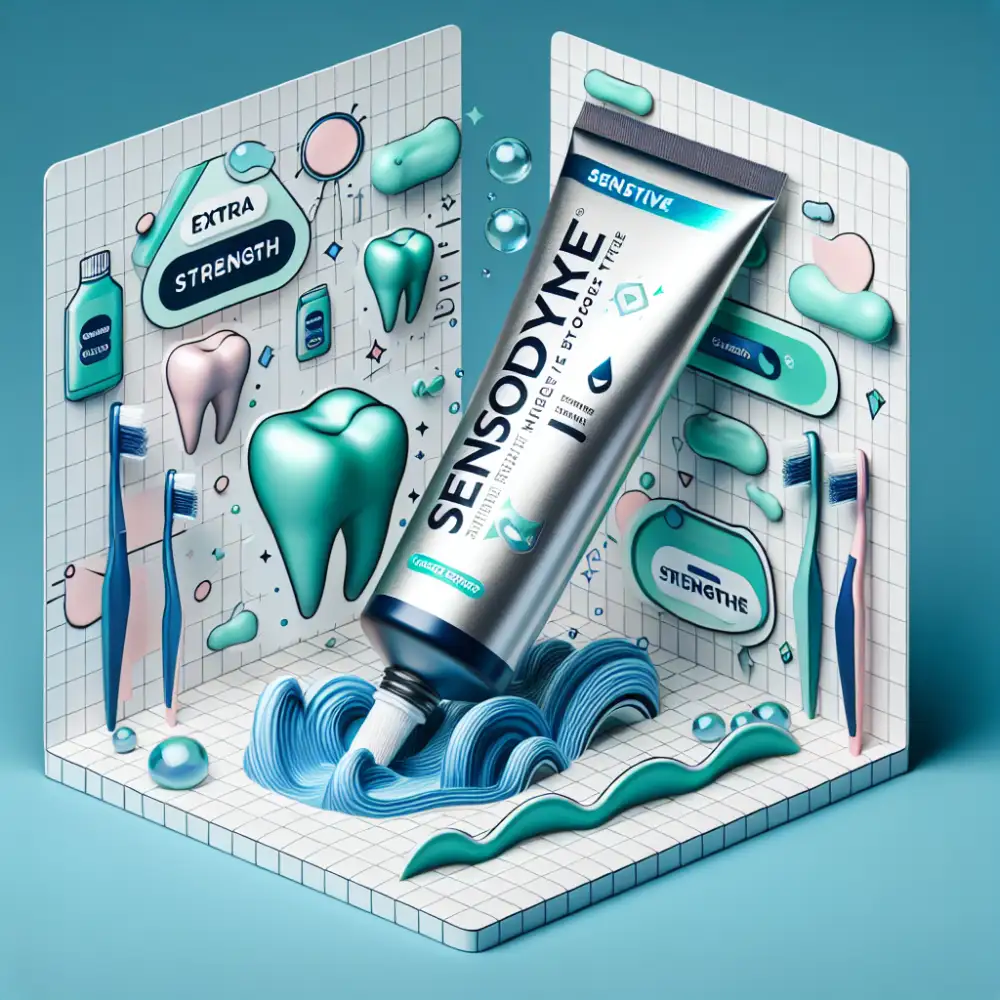Extra Strength Sensodyne: Your New Weapon Against Sensitive Teeth

What is extra strength Sensodyne?
Extra Strength Sensodyne is a toothpaste formulated to provide maximum strength, clinically proven relief from tooth sensitivity. It contains a higher concentration of active ingredients compared to regular Sensodyne toothpastes, making it more effective in targeting and relieving sensitivity pain. The key ingredient in Extra Strength Sensodyne is potassium nitrate, a desensitizing agent that helps block the transmission of pain signals from the tooth's surface to the nerve. When applied regularly, potassium nitrate creates a soothing barrier around the nerve endings, reducing sensitivity to hot, cold, sweet, or acidic foods and drinks.
Extra Strength Sensodyne also contains fluoride, which helps strengthen tooth enamel and prevent cavities. The higher concentration of active ingredients in Extra Strength Sensodyne makes it an ideal choice for individuals with severe or persistent tooth sensitivity. It provides long-lasting relief, allowing you to enjoy your favorite foods and drinks without discomfort. However, it is essential to note that Extra Strength Sensodyne is not a permanent cure for tooth sensitivity. If your sensitivity persists or worsens, it is crucial to consult with a dental professional to rule out any underlying dental conditions.
Ingredients targeting sensitivity
Extra Strength Sensodyne and its more potent counterparts are formulated to tackle tooth sensitivity at its root. The key to their effectiveness lies in specific active ingredients that work in different ways to provide relief.
Potassium nitrate is a common ingredient found in many Sensodyne formulations. It works by calming the nerves inside your teeth. When you experience sensitivity, it's often because these nerves are exposed or irritated. Potassium nitrate essentially desensitizes them, reducing the pain signals sent to your brain.
Another active ingredient found in some Sensodyne toothpastes, particularly the stronger ones, is stannous fluoride. This ingredient pulls double duty. It not only fights sensitivity but also helps prevent cavities and strengthens enamel. Stannous fluoride creates a barrier over the exposed dentin, the sensitive layer beneath your enamel, shielding it from triggers like cold or hot foods.
The choice between Extra Strength Sensodyne and a more potent version often depends on the severity of your sensitivity. If you experience occasional discomfort, Extra Strength might be sufficient. However, for persistent or intense sensitivity, your dentist might recommend a stronger formula containing stannous fluoride or a higher concentration of potassium nitrate.
It's important to note that while Sensodyne can provide significant relief, it's not a permanent cure for sensitivity. If you're experiencing persistent discomfort, it's crucial to consult your dentist to rule out any underlying dental issues that might require specific treatment.

How it works to relieve pain
Sensodyne works differently than regular toothpaste to deliver effective relief from tooth sensitivity. Here's the breakdown:
Sensodyne contains active ingredients like potassium nitrate or stannous fluoride, clinically proven to alleviate sensitivity pain. These ingredients work by calming the nerves inside your teeth.
Imagine tiny tubes, or "dentin tubules," running through the outer layer of your teeth to the nerve center. When these tubules are exposed due to receding gums or enamel wear, hot, cold, or sugary foods can trigger the nerves, causing that sharp, sudden pain.
Sensodyne's active ingredients create a barrier over the exposed dentin tubules, effectively shielding the nerves from these triggers. This action blocks the pain signals from traveling to your brain, providing you with long-lasting relief.
The difference between regular Sensodyne and an extra-strength version lies in the concentration of these active ingredients. As you'd expect, the extra-strength variant contains a higher concentration, providing a more potent barrier against sensitivity. This means faster and longer-lasting relief, especially for those with severe sensitivity.
However, it's important to note that while extra-strength Sensodyne offers a higher concentration of active ingredients, both regular and extra-strength versions are clinically proven to be safe and effective for daily use.
Ultimately, the best choice for you depends on the severity of your sensitivity and your personal preference. If you're experiencing persistent or intense sensitivity, opting for the extra-strength version might be your best bet.
Who should consider using it
Individuals experiencing persistent or intense tooth sensitivity might find extra-strength Sensodyne a suitable option. If regular Sensodyne hasn't provided sufficient relief, the extra-strength variant could be beneficial. People with sensitive teeth often experience discomfort from hot, cold, sweet, or acidic foods and drinks. This sensitivity arises when the dentin, the layer beneath the tooth's enamel, becomes exposed. Sensodyne toothpaste, formulated with desensitizing ingredients like potassium nitrate or stannous fluoride, works by blocking the tubules in the dentin that transmit sensations to the tooth's nerve. This blockage helps reduce the transmission of pain signals, thereby alleviating sensitivity. It's essential to consult a dental professional to determine if extra-strength Sensodyne is appropriate for your specific needs. They can assess the severity of your sensitivity and recommend the most effective treatment plan.
Usage instructions and frequency
Sensodyne Extra Strength and other potent Sensodyne formulations are designed for sensitive teeth and should be used as directed by your dentist or on the product packaging. Typically, you'll apply a pea-sized amount to a soft-bristled toothbrush. Brush your teeth gently for two minutes, twice a day.

Don't swallow the toothpaste. For optimal results and to minimize sensitivity, avoid rinsing your mouth immediately after brushing. This allows the active ingredients to form a protective barrier over your teeth.
While these toothpastes are designed for daily use, you may find relief from sensitivity after a few applications. If your sensitivity persists or worsens, consult your dentist. They can help determine the cause of your sensitivity and recommend the best course of treatment.
Potential side effects and precautions
Sensodyne Extra Strength and similar potent formulations are generally safe for everyday use. However, as with any toothpaste, some individuals may experience side effects. These are usually mild and temporary. The most common side effect is mild tooth sensitivity, especially when you first start using the toothpaste. This usually subsides with continued use. If you experience any persistent or worsening sensitivity, discontinue use and consult your dentist.
While rare, allergic reactions to ingredients like flavorings or potassium nitrate can occur. Symptoms may include mouth sores, swelling, or difficulty breathing. Seek immediate medical attention if you suspect an allergic reaction.
It's important to note that Sensodyne Extra Strength is not intended for children under 12 years of age unless recommended by a dental professional. If accidentally swallowed, seek medical advice or contact your local poison control center.
Remember, Sensodyne Extra Strength is a desensitizing toothpaste, not a substitute for regular dental checkups and cleanings. Maintain good oral hygiene practices, including brushing twice daily and flossing regularly, for optimal oral health. If you have any concerns about using Sensodyne Extra Strength or experience any unusual symptoms, consult your dentist for personalized advice.
Comparison with regular Sensodyne
Regular Sensodyne and Sensodyne Extra Strength both aim to alleviate tooth sensitivity, but they differ in their active ingredient concentration. Regular Sensodyne typically contains a lower concentration of potassium nitrate, while Sensodyne Extra Strength boasts a higher concentration. This difference in concentration translates to a difference in the speed and effectiveness of pain relief.
Think of it this way: if regular Sensodyne offers a gentle touch, Sensodyne Extra Strength provides a firmer hand. For individuals experiencing mild sensitivity, regular Sensodyne might be sufficient. However, for those with moderate to severe sensitivity, the extra strength variant often proves more effective in providing faster and longer-lasting relief.

The choice between the two ultimately depends on the individual's level of sensitivity and desired outcome. Consulting with a dental professional can help determine the most appropriate option for your specific needs.
| Feature | Sensodyne Original | Sensodyne Extra Strength |
|---|---|---|
| Active Ingredient for Sensitivity | Potassium Nitrate | Potassium Nitrate |
| Available Sizes | Varies by retailer | Varies by retailer |
Seeking advice from a dentist
If you're struggling with sensitive teeth, you're not alone. Millions of people experience tooth sensitivity, which can make everyday activities like eating, drinking, and even breathing a pain. While over-the-counter toothpaste like Sensodyne can be helpful, sometimes you need a little extra help. That's where talking to your dentist comes in.
Your dentist can help determine the cause of your sensitivity and recommend the best course of treatment. They may suggest a stronger, prescription-strength toothpaste like some Sensodyne formulations which contain a higher concentration of active ingredients to provide enhanced protection against sensitivity.
Beyond recommending the right toothpaste, your dentist can also:
Identify underlying issues: Sometimes, sensitivity is a symptom of a bigger problem, like a cracked tooth or receding gums. Your dentist can diagnose these issues and provide appropriate treatment.
Offer in-office treatments: For immediate relief or more severe cases, your dentist might offer in-office treatments like fluoride varnishes or dental sealants.
Provide personalized advice: Your dentist can give you personalized advice on managing your sensitivity, including dietary recommendations and oral hygiene tips.
Remember, while Sensodyne can be a great tool for managing sensitive teeth, it's not a substitute for professional dental care. Regular checkups and cleanings, combined with your dentist's expert advice, are essential for maintaining optimal oral health and keeping those sensitive teeth comfortable.
Published: 22. 06. 2024
Category: Food



